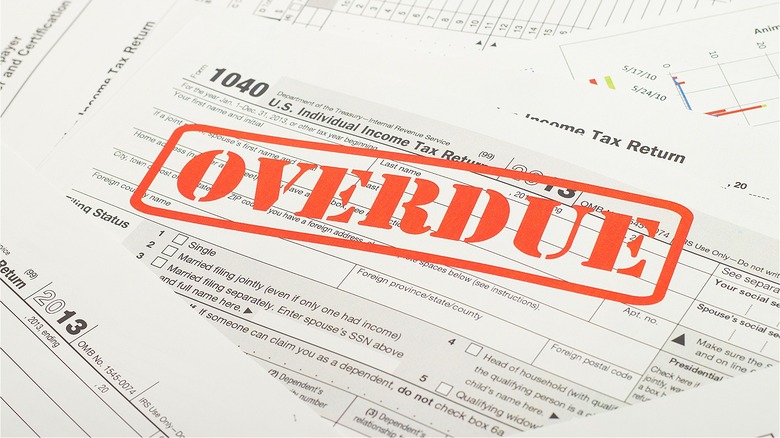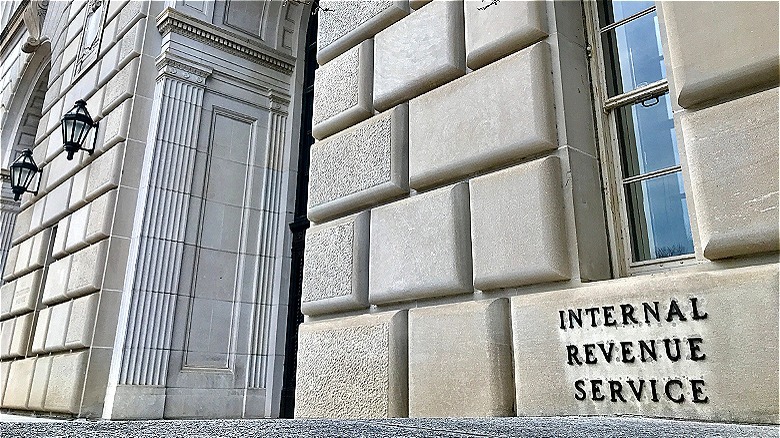What Really Happens When You Don't Pay Your Taxes On Time
Whether you decide to file yourself, use DIY software (such as TurboTax or H&R Block), or you decide to hand everything over to a tax professional, tax season can be stressful and time-consuming. Between determining what tax forms you might need to deciding how you should file, many people can feel overwhelmed by the process. This stress can even cause some taxpayers to avoid doing their taxes altogether. Further, between work, family, and general life happenings, it's easy to understand how some people might end up missing the filing deadline.
Failing to file and/or pay your taxes on time can ultimately lead to a much bigger headache than simply filing in the first place. The IRS can and does charge different penalties and interest for those who may fail to file and/or pay on time. Keep in mind that if you face what the IRS deems "valid reasons" for failing to file or pay on time, you could qualify for penalty removal or reduction. Some of these reasons include fires and/or natural disasters, death or serious illness, or the inability to get your necessary records.
You must be able to demonstrate you exercised proper levels of care and planning in attempting to file in order to qualify. If these situations don't apply, there can be a fair amount of consequences to deal with. Let's dive into what you might face if you fail to pay your taxes on time.
Penalties for not paying your taxes on time
Missing the tax deadline can end up being a pricey mistake. Late filing penalties can end up adding up to 25% to your tax bill. The Internal Revenue Service can apply a Failure to File and/or Failure to Pay penalty depending on your situation. The Failure to File penalty is based on two things: just how late you file and just how much (in unpaid tax) you owe. This unpaid tax amount is the total tax you owe, minus any withholding, previous tax payments, and/or refundable credits (such as the Earned Income Tax Credit). The IRS then charges 5% of the unpaid tax amount every month that your return is late. The Failure to Pay penalty, meanwhile, has slightly different terms. The IRS will charge you 0.5% of your unpaid tax amount every month (or even just part of a month) that your tax is unpaid.
Technically, the IRS can charge you either or both of the penalties but the overall penalty amount you're charged every month won't exceed 5%. After five months (provided it is the only penalty you are dealing with), the Failure to File penalty maxes out (at 25% of your owed amount) while the Failure to Pay penalty will continue until the tax is paid off or the penalty maxes out (also at 25% of your unpaid tax amount). If your return ends up being more than 60 days late, the minimum Failure to File penalty changes to the lesser of an IRS schedule (with specific amounts per period) — or 100% of the underpayment.
In addition to penalties, there's also interest
As if this wasn't bad enough, the IRS also charges interest on top of its penalties. The specific date the IRS starts to charge you this interest can vary quite a bit depending on the type of penalty being applied. For instance, the Failure to Pay penalty begins incurring interest on the return's due date (or on an extended return due date if you filed for one). The Failure to Pay penalty, meanwhile, begins incurring interest the day the IRS sends you notice about the penalty. If you find yourself receiving notice from the IRS about a penalty, it's important to do some research on the penalty to make sure you understand your interest rates.
Regardless of when the IRS starts charging interest, though, this added interest ultimately adds to your total owed amount and can make the process of paying off what you owe take even longer. It's also important to realize that the IRS' interest rates compound on a daily basis, meaning interest is assessed on the previous day's balance (plus interest). In other words, every day past your due date will cost you.
Unpaid taxes are generally charged the federal short-term rate (which changes quarterly) plus 3%. For December 2023, the monthly short-term Applicable Federal Rate (AFR) would be 5.13%. This means if you currently had an IRS penalty due to failing to pay your taxes, you could be getting charged over 8% in interest (daily), plus the 5% penalty fees on whatever your outstanding unpaid amount is.


